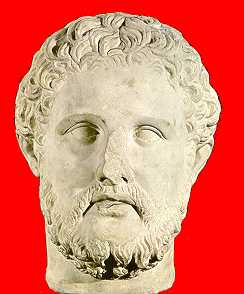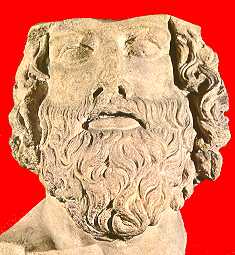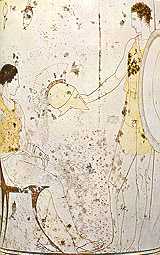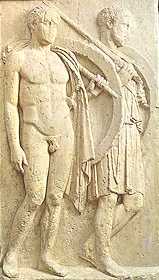 |  |
 |  |
 |  |
 |  |
During the first phase of the Peloponnesian War, known as the Archidamian War (431-421 BC), the Spartans and their allies invaded Attica several times and ravaged the countryside. Also, in the third and final stage of the conflict, the Decelean War (413-404), the Spartans occupied and fortified the area of Decelea in northern Attica which served as a basis for continuous plundering until the defeat of Athens.
This essay, based on the most important surviving ancient sources and the interpretations of modern historians, is an attempt to discuss briefly the question of how much damage the Spartan depredations caused to the Athenian war effort. Since there are differences between the two war periods in discussion, they are going to be treated separately.
Before examining the main issue, a summary of Thucydides' narrative, concerning the Peloponnesian expeditions in Attica during the Archidamian War, is necessary. In the summer of 431, the army of the Peloponnesian League, lead by the Spartan king Archidamus, slowly marched into Athenian territory. After an unsuccessful siege of the Oinoe fort, the invaders started ravaging the areas of Eleusis and the Thriasian plain before settling down in Acharnae. From there, they continued to devastate the area, hoping to drive the Athenians out of their walls and to provoke social disunity among them. The Athenians, despite their fury and frustration, did not come out since the Periclean policy of avoiding major engagements finally prevailed; yet, cavalry squadrons were constantly being sent out in order to harass the enemy and protect the areas near the city. Realising that the enemy was not going to offer a pitched battle, Archidamus took his army from Acharnae and laid waste some demes between mount Parnes and mount Brilessus. Finally, after exhausting their supplies, the Peloponnesians withdrew to their homeland.(1)
At the beginning of the following summer, the forces of Archidamus struck again;(2) they ravaged not only the Attic plain but also the east and west coastal regions as far as Laurium.(3) Although the Peloponnesians retired earlier than they had initially intended because of the plague that broke out in Athens, this second invasion was the longest and most destructive one, lasting for about forty days.(4)
The third offensive came in the summer of 428 with the army of Archidamus ravaging for some time the countryside and being harassed as usual by the Athenian cavalry.(5) Next year , the Peloponnesian troops are reported to have destroyed everything that had grown up or had been spared during the previous invasions.(6) The fifth and final expedition took place in the summer of 425 under the command of the young king Agis, son of Archidamus.(7) When the astonishing news of the Spartan surrender at Pylos reached his camp Agis withdrew, having stayed in Attica only for fifteen days; besides, the weather had been rather bad and the corn was still green.(8) Afterwards, the Athenians threatened to kill the Lacedaemonian prisoners if the Peloponnesians were to invade once more.(9) Consequently, no other offensives were launched against Attica for the rest of the Archidamian War.
Analysing the Spartan strategy of the Archidamian War is not the purpose of this essay but a few words, concerning the objectives of the Peloponnesian expeditions, should be mentioned. It is certain that there were Greeks who believed that the Spartan depredations in Attica would, sooner or later , force the Athenians to submit as it had happened earlier in the First Peloponnesian War. Still, it must have been realised, by some Spartans at least, that perhaps this strategy might not work this time because the enemy might choose to abandon his lands since the powerful Athenian fleet could supply the city with the necessary provisions.(10) Whether or not the annual invasions had really been the key factor of the Spartan strategy during the Archidamian War is debatable. Most probably, the invasions and depredations, initially at least, had aimed at the submission of Athens in accordance with the traditional pattern of hoplite warfare; that is, causing food shortages and discomfort to the enemy, thus forcing him to accept the challenge and offer a battle. It is also possible that the invasions had not been the sole aspect of the Spartan grand strategy but a part of it, not necessarily the predominant one, or perhaps they had been launched simply because there were no other promising and realistic alternatives at that time.(11) At any rate, the fact remains that the Peloponnesians ravaged Attica five times in seven years, naturally hoping to gain something from that. Whatever the Spartan goals might had been, let's see now what it had been really accomplished.
In order to assess the damage caused to the Athenian war effort by the Spartan depredations we should have a brief look at several factors such as the Athenian counter-measures and their effectiveness, the kind and extent of devastation inflicted on the Attic land and search also for possible other problems that the invasions created to Athens. The examination of all these factors will enable us to determine whether the Peloponnesian action in Attica had been successful and to what extent.
The Athenians, in response to the invasions, took several measures in order to limit the damage as much as possible. First of all, they evacuated the threatened areas and brought to Athens their household goods-even the woodwork from their houses-and sent their stock to Euboea and the nearby islands.(12) Furthermore, the Athenian cavalry was used in the 'mobile defence' role, continually harassing the invaders and trying to protect the countryside, primarily the areas near the city and possibly the most important food supply districts. The various border forts of Attica could have also taken part in this effort, although the action of their garrisons would have been less important than that of the cavalry patrols. All this army activity was aimed not only at the protection of the land but also at boosting Athenian morale; under the circumstances, it appears to have been the best military response to the invaders.(13) Finally, the imported supplies, although very costly, could replace the possible loss of foodstuff.(14) After all, Pericles was not far from reality when he claimed in the assembly of the Athenians that ' with your navy as it is today there is no power on earth ... which can stop you from sailing where you wish'.(15) It is almost certain though that the Athenians did not rely exclusively on risky and expensive imports and that farming did not really stop all over Attica during the Archidamian War.(16)
This brings us to the next issue in discussion. Concerning the kind and extent of the depredations there is no consensus among modern historians. It has been suggested that the damage to Attica was really great.(17) It appears though that the actual size of the devastation has been rather exaggerated, since many convincing arguments in favour of this view have been presented.
There are several factors that seem to have prevented a large scale devastation during the Archidamian War. First of all, the duration of the invasions; it has been estimated that, throughout this phase of the war, the Peloponnesians ravaged Attica for less than 120 days.(18) Having in mind the rough and peculiar Attic terrain, it seems impossible that the invaders could even reach-let alone systematically devastate-all the land in such a short period of time. Besides, not all of these 120 days were actually spent in ravaging and of course not all of the Peloponnesian troops were engaged in this activity. Also, the fact that the invasions planned for 429 and 426 never took place would have allowed the countryside to recover. Furthermore, there is evidence that large areas of Attica were spared by the invaders for religious or other reasons.(19) In connection with the brief duration of the invasions it should be mentioned that the cereal harvest in Greece can cover a long period, depending on the location of the plot, the altitude the local weather conditions, the species and varieties planted. Thus, the Athenian farmers had a relative advantage over the ravagers, who would fail to lay hands on a quite large portion of the harvest since they would stay in Attica for only a few weeks each year.(20)
There are also some practical considerations about the ancient methods of ravaging which add more weight to the argument that the devastation had not been so great. The destruction of crops, trees and farm buildings was a difficult and time-consuming task. For example, cutting down or burning olive trees and grain was not as easy, quick or efficient as it might seem today.(21) Finally, the initial evacuation of certain areas by the Athenians must have saved a lot, while the combined activity of the cavalry and the frontier garrisons must have contributed up to a point to the limitation of the agricultural damage.(22)
No doubt, the invasions caused economic losses but these can not have been alarming since, as Gomme wrote, 'we hear nothing of any special effect of the invasions on Athenian finance during the Archidamian War'.(23) So, it appears that the Peloponnesian ravaging of Attica had not been effective enough to seriously damage the war effort. Yet, it had posed a kind of threat to the social unity of Athens, creating discontent, envy and possible friction between those farmers who had suffered the most and those urbanites or other farmers who had not. This psychological factor should not be ignored although its effects did not finally reach dangerous levels.(24)
In conclusion, the Spartan strategy of depredations in Attica can be considered at least ineffective.(25) The Spartans had not been able to force the Athenians out of their walls for a pitched battle nor to drive them to capitulation through starvation. According to Hanson, the real damage done to the Athenians '... was not the loss of agriculture, but the physical and psychological problems caused by moving a great number of people off their lands into cramp and depressing conditions within the city walls'.(26) Finally, Thucydides himself and the unknown Oxyrhynchus Historian have stated that the invasions during the Archidamian War had done little damage to Attica in comparison with what happened later in the Decelean War.(27)
This brings us to the second part of the essay. In 413, at the beginning of spring, the Peloponnesians, under king Agis, invaded Attica and fortified Decelea.(28) This was a place about 14 miles north-east of Athens on high stony ground and strategically important since it dominated the route into Boetia.(29)
According to Thucydides, the Athenians suffered a lot from the attacks of the enemy garrisons based in Decelea. The Peloponnesian activity created so much loss of property and man power that it was a major reason for the decline of Athens. Now the Athenians found themselves under continuous and great pressure; they lost all their farm animals, they were unable to cultivate their fields and were obliged to import everything they needed by sea. Additionally, more than 20,000 slaves deserted. The Athenian cavalry conducted patrols and made attacks on the enemy every day, while the citizens had to be on alert all the time; the city became a fort. Consequently, the war expenses grew so much that Athens imposed a new tax on its subjects.(30)
Obviously, the Peloponnesians were now trying more vigorously and systematically to achieve what they had attempted in the Archidamian War.(31) They were determined to exhaust the Athenian resources and bring the enemy to his knees.(32) Still, king Agis realised that even the continuous depredations would not be sufficient for this purpose and that serious naval operations should be undertaken by the Peloponnesians.(33)
There is no doubt that the damage generally done during the Decelean War was far greater than ever before; the Peloponnesian ravaging and plundering parties operated at all seasons in Attica for almost 9 years. Concerning the extent of the agricultural devastation it is argued that, although it was considerable, it has been once again exaggerated.(34) For example, Hanson suggests that olive trees and vines were not extensively destroyed.(35) Furthermore, the Athenian cavalry and infantry patrols together with the garrisons of the frontier forts prevented up to a point a large scale devastation, once again helped by the nature of the Attic terrain. Besides, the number of the enemy troops stationed in Decelea was most of the time rather small and inadequate to ravage Attica thoroughly.(36)
Whatever the exact size of the agricultural damage might had been, it is not disputed that the domestic economy of Athens turned to the worse. The loss of property had been enormous. Slaves, animal stock and household goods were taken by the enemy; the silver mines of Laurium most possibly ceased to operate; moreover, due to the occupation of Decelea, all the imports had to be brought to the city via a longer route which added to the cost.(37) Also, many Athenians who lost their farms must have fallen into poverty and, consequently, to the lower class. The needs of all these people obliged the state to provide them with some means of survival and economic measures were taken. Naturally, these measures added to the already heavy financial burden of Athens.(38) One can imagine the condition and the feelings of those impoverished people who had been denied access to their fields, had seen their farms plundered and had been compelled to live in overcrowded conditions within the walls and carry on fighting for the Athenian empire.
In conclusion, it seems that 'the Spartan fort at Decelea wore the Athenians down financially as well as physically and psychologically'.(39) Yet, as Henderson comments, 'Decelea was a running sore ... but though the evil was incurable it was not fatal'.(40) The Peloponnesian depredations this time caused very serious damage to the Athenian war effort but it was not that war of attrition which finally brought Athens down. King Agis, watching from Decelea the ships constantly carrying provisions to Piraeus, had remarked that it was useless to devastate Attica unless the Spartans were also able to control the sea.(41) Athens had created an empire based on its navy and it appears that the only way for the Spartans to defeat that empire was to destroy its fleet. The end came at Aigos Potami.